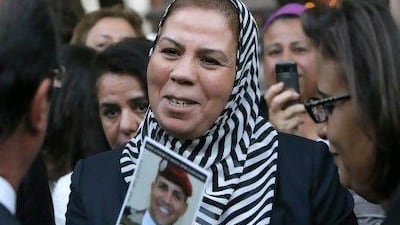Marseille, France // A mother's need to know where her son's killer grew up led her to launch a foundation that aims to stop young French Muslims turning to extremism.
In a suburb of Toulouse, Latifa Ibn Ziaten was shocked to find young residents regarding Mohamed Merah, who murdered seven people in March before being shot dead by police, as "a martyr, a hero of Islam".
Her experience left in her little doubt there would be "another Mohamed Merah" unless France made a greater effort to reach out to disaffected young people of Maghrebin origin.
Merah, 23, born in France to Algerian parents, had claimed to belong to Al Qaeda in exchanges with officers trying to persuade him to surrender.
Only when Mrs Ziaten explained to the young men she encountered that she, a Muslim like them, was the mother of Merah's first victim, Imad Ibn Ziaten, 30, an off-duty soldier, did their defiance give way to signs of contrition.
"They changed immediately and kept saying 'sorry, madame'," Mrs Ziaten, 52, said in an emotional account of her visit, shown during a France 2 television debate on Islam.
She said she stopped to speak to the group for about 45 minutes. In another interview, she recalled telling them Merah was "not an example, but a murderer who did not merit his first name".
Mrs Ziaten, born in Morocco but a resident of France since her late teens, decided to create the Imad association "for youth and peace" as a way of ensuring some good came from her son's death.
Hundreds of sympathisers have joined a Facebook group she set up with another son, Hatim, and she plans to visit prisons, schools and tough neighbourhoods to promote tolerance and non-violence.
Imad, the second of five children, was a staff sergeant in France's 1st parachute logistics regiment. He was shot in the head outside a gym in Toulouse after keeping an appointment with Merah on March 11. The killer had said he was interested in buying a motorcycle from him.
Four days later, Merah killed two other paratroopers and gravely wounded a third outside their barracks in the city of Montauban. He murdered three children and the father of two of them outside a Jewish school in Toulouse on March 19.
Merah was shot dead three days later after a police siege at his flat.
"My son was a serious, honest man who was proud of serving his country," Mrs Ziaten told French radio. "He was a practising Muslim but was not killed because he was a Muslim, but because he was a soldier ... I do not want another mother to suffer as I have."
Speaking from her home in Sotteville-les-Rouen, a suburb of the Normandy city of Rouen, she said the association's plans were already at an advanced stage.
She has held preparatory discussions with prison and school officials and hopes to start her visits next month.
Her son, Hatim, 32, a sports teacher, said the association - association-imad.fr - would address "the dangers of radicalism, particularly in prisons".
Merah, who had a long record of delinquency and petty crime, reportedly became radicalised in jail.
"We must combat the stigmatisation that equates Islam, a religion of tolerance, with terrorism," said Hatim. "We want to show that Imad's death was not for nothing and that his memory will live on in a movement for young people and peace."
His mother, a former school cook who now works in local government, said she felt compelled to see for herself where Merah had lived and developed his hatred. "The young people I met there have these ideas in their heads because they have nothing else to occupy them."
Abdallah Zekri, president of France's Anti-Islamophobia Observatory, said he was aware of some pro-Merah feeling in Toulouse after the March killings.
After watching the France 2 film of Mrs Ziaten's appeal for "immediate" initiatives to help young Muslims, he said he had insisted on a swift burial of Merah, against the wishes of local authorities, because he knew some youths wanted to demonstrate their solidarity. In the event, a small number of hooded young men turned up for the ceremony but were "chased from the cemetery".
Mrs Ziaten was visiting Turkey with her husband, Ahmed, also Moroccan and a retired railway worker, when a call from France cut short their holiday. Before leaving for Turkey, she had felt reassured in the knowledge her son, who had often served overseas, was in France and not "on a mission".
She feels investigators could have prevented the subsequent killings had they paid more attention to the supposed buyer of her son's motorcycle. She also regrets Merah was not captured alive, saying Nicolas Sarkozy, then French president, had told her this was the intention.
"Islam represents peace and generosity," she said. "To kill, to cause suffering, God never said that ... My message, to anyone in the world who hears it, is one of peace, the peace that every country, whether Arab or western, yearns for."
Last week, France unveiled a new bill to tighten France's antiterrorism laws and deter French youths from travelling abroad for training in paramilitary camps. The impetus: the death of Mrs Ziaten's son and Merah's other victims.
* With additional reporting by the Associated Press


